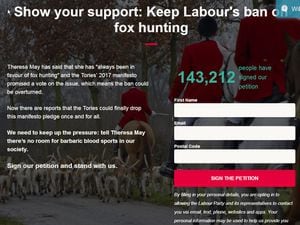Fighting for votes over fox hunting row
Fox hunting is set to become a major political issue for 2018 as Labour continues its search for power.

The party is highlighting the issue, which it believes resonates with wavering voters.
It comes as the traditional Boxing day hunts took to the streets of Shropshire and mid-Wales, with two very different reactions from the general public.
There were the crowds who lined the streets of Newport, Welshpool, Ludlow, Bishop's Castle and Albrighton Hall, near Shrewsbury, to enjoy the spectacle of the horses, hounds and red jackets. At Newport, small children were pictured patting the dogs.
At the same time, the hunt was accompanied by the now-customary anti-hunt protesters who waved banners and jeered as the hunts took part in their parades.
But this year, the protests seem to have stepped up a gear, with nearly 150,000 people signing a new petition organised by the Labour Party against any plans to repeal the ban on hunting with dogs, which has been in force since 2004.
The law bans the use of dogs to kill any wild mammals, although "drag hunts", such as those seen on Boxing Day, are allowed to follow a scent laid out beforehand.

While the petition demonstrates clear opposition to any attempts to lift the ban – and the League of Cruel Sports says 85 per cent of people want to see the ban retained – questions have been asked about why Labour has chosen to promote the petition at a time when there seems to be little appetite from Government to repeal the law.
While the Conservative General Election manifesto committed to holding a free vote on the matter earlier this year, the pledge was quietly dropped from the Queen's Speech, presumably due to a lack of parliamentary majority. Speculation has been growing that Theresa May will make an announcement in the New Year ruling out any plans to lift the ban in the foreseeable future, and she has already ruled out a vote in the current parliamentary session which runs until 2019.

So why has Labour chosen to raise the issue now, when there does not appear to be any prospect of the law being changed? Political commentator Jim Waterson believes it might be part of a much wider, and extremely clever, ruse.
Even Jeremy Corbyn's fiercest critics would acknowledge that he has been extremely successful at using social media to rally support among young activists. Mr Waterson observes that the party has spent recent weeks buying advertising space accompanying stories on the Instagram websites, painting the Conservatives as being intent on bringing hunting back, and inviting people to support the petition.

A powerful message no doubt to those who consider fox-hunting as reprehensible. But Mr Waterson also points out that the small print at the bottom of the petition says that by providing personal details, those who sign the petition are also deemed to have opted in to being contacted by Labour through text messages, emails, phone apps and websites.
Tory MP for Montgomeryshire, Glyn Davies, believes this is the real reason for the petition.
"It's just a stunt, to harvest personal details," he says.
Mr Davies, who attended the Welshpool hunt as a spectator, says it is highly unlikely there will be any moves to change the law on hunting anytime soon.

"I don't think the Government has said anything about it," he says. "My own view is that it is a bit pointless as there is no majority in Parliament to repeal the law, it is all a complete waste of time."
Mr Davies says he, like the majority of people who turned out to watch, has never been on a hunt and has no interest in doing so.
But he adds: "I'm always amazed how friendly and orderly everyone is, bearing in mind the antipathy hunting with dogs seems to generate."
Labour leader Jeremy Corbyn is a longstanding opponent of hunting, and said his experience of the sport growing up in rural Shropshire was one of the things that made him politically active.

Urging people to sign the petition, he says: "Fox hunting is cruel and barbaric.
“The Government must permanently rule out any plans for a vote on overturning the ban.”
However, if Mr Waterson's theory about the motives behind the petition are correct – The Labour Party declined to comment when asked about the claims – it is the latest example of the increasingly sophisticated methods being used across the political spectrum to garner your support without you even realising you are being targeted.
In its most basic form, the controversial red bus used in the Vote Leave referendum campaign, which said the EU received £350 million a week from Britain, is an example where the subtle underlying psychology is more important than the message itself.

It was recently reported that the campaign had actually discussed using the less contentious figure of £280 million – which is the net cost of EU membership, once rebates are taken into consideration – on the bus. But while it would probably have had a similar impact – £280 million still sounds a lot to the man in the street – it would not have generated the angry backlash from Remain supporters. The Vote Leave campaign deliberately chose the more provocative message to get a reaction from their opponents, ensuring that the cost of EU membership would be the subject that dominated the news agenda.
Mr Waterson, who is political editor of the Buzzfeed website, has conducted research into the way that all the major political parties poured vast sums into social media advertising at the 2017 General Election – and how Labour totally outwitted the Conservatives with its under-the-radar, grassroots campaign.
While the Conservatives largely focused on using Facebook advertising in target seats, Labour used its network of party activitists in marginal constituencies to find which issues concerned individual voters most, and then blitz their Facebook profiles with specially targeted material.
For example, a voter in a marginal constituency who raised concerns about the NHS to a party activist on the doorstep, would see their Facebook profile targeted with advertising relating to this the following day.
At the heart of the Labour digital strategy was a system that allowed the party to build in-depth profiles of individual voters, work out whether they voted regularly, personalise the campaign material these individuals received in the post and online, and hammer home relevant messages, says Mr Waterson.
The conclusion one may draw is that any hunt members hoping for a change in the law in the foreseeable future are likely to be disappointed. And that anti-hunt protesters who want to see the law retained in its present form will almost certainly see their wish granted.
But they will probably also find their email inboxes becoming increasingly busy over the next few months as the nature of political campaigning changes beyond recognition.





